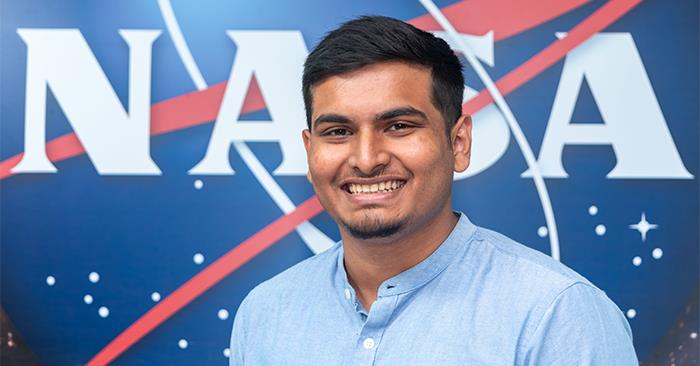NASA Internship Opens Up World of Opportunities

Thirtha Karmakar
It is widely accepted that internships offer students experiences outside of the classroom. Not all of them include having lunch with a Nobel Prize winner, but that’s just one of the many amazing experiences Thirtha Karmakar had this summer as part of his internship with NASA at the Goddard Space Flight Center (GSFC) in Maryland.
“My internship was a surreal experience,” he said. “I really enjoyed working in the collaborative and intellectual atmosphere of a research institution.”
Much of Karmakar’s summer was spent using cosmological simulation data of black hole mergers to figure out what kinds of gravitational waves the mergers would generate. His work will contribute to the Laser Interferometer Space Antenna, or LISA, a planned space probe designed to detect and accurately measure gravitational waves. For Karmakar, the research is not only cool, it is rooted in his childhood.
“From an early age, I was fascinated by the stars in the night sky. Stars and black holes always amazed me. I was awestruck when I learned that we are witnessing glimpses of stars as they were billions of years ago, experiencing their light from the distant past,” he said. “Extreme objects reveal the fundamental nature of our universe and show us how they truly work. Black holes, being among the most extreme objects, can provide insight into fundamental physics. They play a pivotal role in the evolution of galaxies and in our understanding of gravity.”
Considering Karmakar is only a junior, it would be fair to say the stars aligned for his internship. An international student from Noakhali, Bangladesh, he knew he wanted to be a physicist, and that research would play a key role in advancing his career. Karmakar took advantage of Truman’s Emerging Innovators Grant, a summer research program for first-year students in physics and computer science. In summer 2023 he applied for it with Colin DeGraf, assistant professor of physics, on a project researching gravitational waves generated from black hole mergers. As part of the grant, he presented his findings at the American Astronomical Society Conference in January 2024, where he met Dr. Amber Straughn, an astrophysicist at GSFC. She put him in touch with Dr. John Baker, the branch chief of the Gravitational Astrophysics Lab at GSFC, who was working on similar research. Baker also happens to be a Truman alumnus. Karmakar emailed his CV and research poster to Baker, and simultaneously applied for and was accepted to the CRESST Summer Internship Program that matches interns with a scientist from GSFC. Fast forward to the summer, and Karmakar was spending his days doing computational research on a topic he loves in a lab overseen by a fellow Bulldog.
“Working in a lab with the people who are in the forefront of their research, I got really inspired to be a physicist even more,” Karmakar said. “I got to meet interns from all over U.S., and even from South Korea. I learned about the amazing research projects they were working on and their stories how they got interested physics and astronomy.”
The internship provided a unique opportunity for Baker as well.
“NASA hosts student interns from all over the country, but this was the first time I got to work with someone from my alma mater,” he said.
As part of the internship, Karmakar got an insider’s perspective in many areas, including the NASA supercomputer facility and labs for Helio physics, Earth science and astrobiology. One particularly intriguing project was DAVINCI, short for Deep Atmosphere Venus Investigation of Noble Gases, Chemistry and Imaging, a probe and flyby mission that will explore Venus to help understand planetary origins. One time, Karmakar had the opportunity to have lunch with Dr. John Mather, who won the Nobel Prize in physics for his work on the Cosmic Background Explorer Satellite.
“It was fascinating how he started describing the Big Bang as a starting point of everything, rather than a traditional explosion,” he said.
Karmakar plans to attend graduate school for astrophysics after graduating from Truman. For now, he is unsure what particular specialty he may eventually pursue. His time with NASA this summer sparked interests in multiple areas, and maybe even changed his career trajectory.
“After graduate school, initially my goal was to become a professor, as I enjoy sharing ideas with others,” he said. “After my internship experience this summer, I also discovered a strong interest in working at a research institution like NASA. In the future, I would be happy to pursue either path.”
